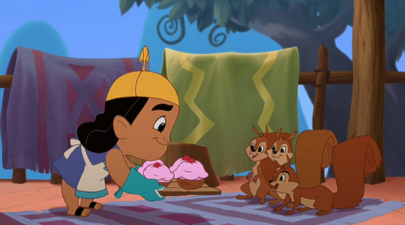I wonder sometimes if the biggest problem with Disney is that they want the amount of money they make to keep increasing. Which sounds funny to say, I suppose. But I mean that they’re not happy with having their profits merely keep up with inflation and want them to increase exponentially, going up and up and up and up. And so they do things like buy other studios and keep raising park prices and so forth. And, yes, make cheap cash-grab direct-to-video movies like this one, because they probably don’t cost all that much and small children tend toward completionism.
Kronk, as voiced by Patrick Warburton, had been the stand-out character of 2000’s The Emperor’s New Groove. In this movie, he is happily working at Mudka’s Meat Hut until he gets a Lllamagram that his father (John Mahoney) is coming for a visit. His father had always told him that he would be a failure until he had a wife and children and a house on a hill, and Kronk has internalized this. He doesn’t have a house on the hill because of [flashback]. He doesn’t have a wife and kids because of [flashback]. So he is a failure, and his father will reject him, and he will deserve it.
Honestly, you know, this movie shows how Daddy Issues can turn into a workable story. Because the story is of course driven by Kronk’s fear of his father’s rejection. Kronk does some bad things because he’s going to get the things that will make his father think he’s not a failure. He is, on the other hand, inherently moral enough so that he’d rather be rejected by his father than do the wrong thing, and that conflict is interesting. I’m not, you understand, saying this is the best possible presentation of that conflict; this is still direct-to-video Disney stuff, here, though it’s top-tier direct-to-video Disney. But it’s a way to take a tired motivation and go somewhere with it.
Would that they’d done the same with their shaming of Yzma (Eartha Kitt). This is the first direct-to-video Disney sequel to keep the original movie cast, and that’s great, but I’m not sure we needed to bring David Spade back as Kuzco just to have him shame Yzma for having unevenly shaven armpits. At that moment, I informed my five-year-old son firmly that it’s none of anyone else’s business how or even if someone shaves their armpits. I can’t help wondering if we’d still be making those jokes if the movies were made today. I’m pretty sure we would, and I’m not thrilled.
I do, on the other hand, like that Kronk is such a nice guy that literally everyone who knows him other than his Papi cares enough about him to want his Papi to like him. Now, me, I’m the kind of person whose show of support would be to help him to see why his Papi’s approval shouldn’t matter so much, if his Papi could only be good to him if he showed tangible signs of success. But pretty well everyone he knows is willing to pretend to be his wife or his kid, and that’s really heartwarming and should be a sign to Papi that Kronk is a success even if he’s not the kind of success that Papi wants him to be.
I also, I have to say, suspect that his relationship with his father led to his relationship with Yzma—his father is emotionally abusive and emotionally distant. So he expects that in his authority figures and doesn’t know how to expect to have his emotionally needs properly met. So he doesn’t realize how poorly Yzma treats him.The movie doesn’t make it explicity, but come on—it doesn’t have to.
I am a little curious as to when we’ve had time for all this to happen. Canonically, we’re looking at less than a year since the events of the first movie. It must be, since Chicha (Wendie Malick) was pregnant in the first movie, and the baby’s said to be “a half” at one point. Yet Kronk’s had time to earn and give away a fortune helping Yzma with a fountain of youth potion and meet and lose a girlfriend at Camp Chippamunka. Also, this means that a year earlier, Kronk was assistant to the emperor’s primary advisor, which seems awfully successful to me, but since this isn’t the narrowly defined success his Papi set when he was a child, it doesn’t count.
Taking out the Ms. Birdwell (Tracey Ullman) plot not only would’ve helped the timeline make sense, it might also have helped drive home the fact that success is how you make it. From any reasonable standard, Kronk is successful. He’s got a good job doing what he loves that pays enough to meet his needs. He is friends with pretty much everyone he knows. Maybe he doesn’t have a wife and kids and a house on a hill, but does he really need them? He connects with all kinds of kids as a Junior Chipmunks leader, if he feels the need for connections with kids. He’s fulfilled in his work and his art. And it would have helped him separate some from his dad, too.
On a purely personal note, “papi” is now slang that’s always going to make me think about the Renaissance faire I go to, where our King Philip is delightfully anachronistic and uses all kinds of modern slang and calls me “mi’ja.” (Which, for the unfamiliar, is short for “mi hija,” or “my daughter.”) I was selling him a pin at work one day, and a little fan club of his was holding up a slate with “Hola papi” written on it. He doesn’t read my column. But if he did, you know, hola, Papi.
Show approval of my art; contribute to my Patreon!

